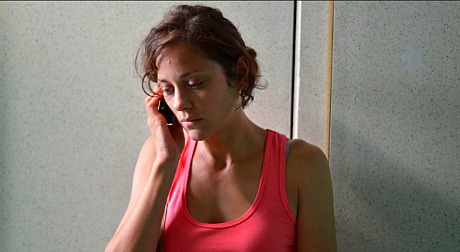Earlier today I again failed to write some kind of review of Michael Mann‘s underwhelming Blackhat. My immersion in that urban existential angsty machismo thing has been a profound deal for me, especially as manifested in Thief, Heat, The Insider and Collateral. I was even a fan of nearly all of Public Enemies (particularly that socko ending scene between Marion Cotillard and Stephen Lang) but that film was the first indication that Mann might be losing some of the touch. And I guess I’m confessing that the failure of Blackhat feels so…the word isn’t shattering. I don’t know what to call it. Profoundly fatiguing? Soul-collapsing? I only know it’s been very difficult to put words to page. I also know that the guy who directed the Kate Mantilini scene between Al Pacino and Robert DeNiro in Heat had nothing to do with Blackhat, and it pains me to say that a lot more than it might pain Mann to read it. I guess I could try writing a bit more but I want to be done with this as quickly as possible. When I come back from a quick errand I’m just going to talk through my issues and disappointments and then post an mp3. I know I can do that, at least.
Year: 2015
Man In The Glass Booth
John Hardwick‘s The Eichmann Show (BBC Two, 1.20) is a behind-the-scenes tale of how the 1961 trial of Nazi war criminal Adolf Eichmann was captured on TV by Milton Fruchtman (Martin Freeman) and blacklisted TV director Leo Hurwitz (Anthony LaPaglia). Filming at the trial in Jerusalem in 1961, Fruchtman and Hurwitz’s presentation was edited daily and broadcast in Germany, America, Israel and 34 other countries. The release says it “became the world’s first ever global TV documentary series” and for the first time “conveyed the horror of the European concentration camps directly from the mouths of its victims.” LaPaglia looks older…heavier, whitewalls.
Scientology Again?
The Church of Scientology has paid for a full-page ad that preemptively denounces Alex Gibney‘s Going Clear: Scientology and the Prison of Belief…of course! The Scientologists have always aggressively gone after their critics so who’s surprised? The presumably scathing documentary will premiere on Sunday, 1.25, at the Sundance Film Festival, and then have a modest theatrical run before an HBO debut on March 16. What’s new to say about these dickheads anyhow? Scientology exposes were journalistically intriguing in the mid ’90s. Occasional hiccups and rants from Tom Cruise certainly brought renewed attention to the controversial church over the years. But when I first read about Gibney’s doc I kinda went “meh.” As Michael Cieply notes in a 1.15 N.Y. Times piece about the full-page ad, “The church’s forceful response risks calling attention to what might have seemed like old news.” But who am I to pre-judge? I’ll be there with bells on when Going Clear has its first peek-out at the MARC theatre at 2:30 pm.
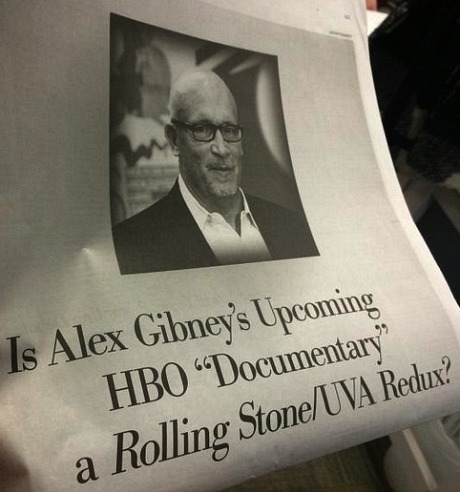
At The Risk Of Inflaming Things
After being handed an MVP Award at last night’s Critics Choice Movie Awards (which I attended, sitting at table #49), Jessica Chastain spoke of the general need for more “diversity.” Right now diversity is a p.c. code term that means Selma‘s Ava DuVernay should have been nominated for a Best Director Oscar (it would have been a nice token gesture) and David Oyelowo should have been nominated for Best Actor (okay but who would he have bumped?). Things would feel more congenial if this had happened, for sure, but I still don’t think Selma is good enough to be celebrated as one of the year’s absolute best. That’s a minority opinion, I recognize. It can also get you branded as someone who doesn’t quite get it and who should perhaps (what do you think, guys?) be kept at arm’s length. Trust me — that’s what the cool kidz are saying without actually saying. Get with the pro-Selma mentality or we won’t let you attend parties and meetings in our little clubhouse.
“Today is Martin Luther King Jr.’s birthday, so it got me thinking about our need to build the strength of diversity in our industry,” Chastain said, “and to stand together against homophobic, sexist, misogynist, anti-Semitic, and racist agendas. I’m an optimist, and I can’t help but feel hopeful about the future of film, especially looking at all these beautiful people in this room. Martin Luther King Jr. said, ‘Our lives begin to end the day we become silent about things that matter.’ And I would like to encourage everyone in this room to please speak up.”
That’s funny because we all know what that means apart from what King meant originally. It means that “we all need to tell the conservative, sentimental fuddy-duds to back off and reconsider because this is right effing now and we need to nominate and celebrate films like Selma because that Norman Jewison world all you grandpas grew up with is no more.”
Yes, agreed, of course. And I trust I don’t need to prove to anyone that nobody despises the Academy fuddy-duds more than myself. But that still doesn’t mean Selma is anything more than a good, sturdy capturing of a noble, tumultuous struggle. Y’all need to calm down.
I almost fell out of my chair this morning when I read the following sentence by Salon‘s Andrew O’Hehir: “You can certainly defend, in the abstract, the idea that movie awards should be entirely about the art and craft of cinema, not about who made the movies.” Really? We’re allowed to say such a thing? But if we do, won’t we get ourselves into trouble?
French Pork
That 1.66:1 French Bluray of Pork Chop Hill that I mentioned on 1.5 arrived yesterday. Some might think it eccentric if not wasteful to buy a Bluray of this 1959 Lewis Milestone-Gregory Peck war film when I can just as easily rent a high-def version on Amazon.com, but the Amazon version is cropped at 1.78 and the recently-popped Olive Bluray is cleavered at 1.85, and there’s a world of difference between these and 1.66. Consider the 1.66 vs. 1.85 screen captures below — either you get it or you don’t. The only problem with the import is that I can’t seem to kill the French subtitles when I play the original English-language version.

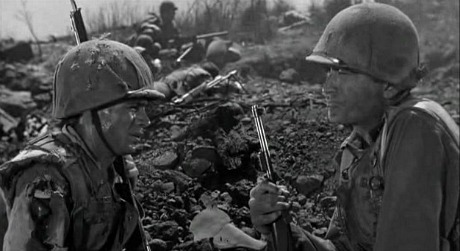


Adults to Great-Grandkids: Have Fun!
Yesterday a report summarized in Science, the respected journal, reminded the thinking, semi-conscious world of the same old environment tune for the umnpteenth time — i.e., the earth is not only becoming less and less hospitable, but in the coming decades our once-green planet “could cease to be a ‘safe operating space’ for human beings.” The report explains that we’ve already crossed four “planetary boundaries” — the extinction rate, deforestation, the level of carbon dioxide in the atmosphere, and the flow of nitrogen and phosphorous (used on land as fertilizer) into the ocean.
ADD translation: The report basically says that the grim environmental slide is getting steeper and that we’re all shitting the bed faster than previously understood. You thought things seemed bad when An Inconvenient Truth popped eight years ago? Wake up and smell the new brew.
Correcting Academy Oversights
My respects to the 20th Annual Critics Choice Awards for getting a few things right that the Oscar nominations got wrong.
Instead of failing to nominate the widely-praised The LEGO Movie for Best Animated Feature, as the Academy did this morning, the Broadcast Film Critics Association stood up and gave it the big prize. Instead of ignoring Gillian Flynn‘s adaptation of her Gone Girl novel, as the Academy did this morning, the Critics Choice guys gave Flynn their Best Adapted Screenplay award. The Academy declined to nominate Steve James‘ Life Itself, an affectionate portrait of the late Roger Ebert, for Best Documentary Feature, and tonight the BFCA give it that very award. And Birdman‘s Antonio Sanchez, whose all-percussion score was churlishly disqualified by the Academy’s music branch, won the Critics Choice Award for Best Score.
And Obvious Child‘s Jenny Slate, who gave one of the most engaging, deep-down female performances of the year, won Best Actress in a Comedy. No one expected the Academy to nominate her for Best Actress — she wasn’t in the conversation, had no backing, had barely campaigned — but it was great to see her win tonight. This and more to come.
Don’t Kid Yourself
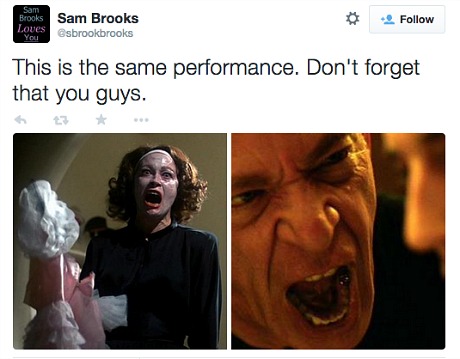

My craving for color photos of scenes or set-stills from renowned black-and-white films is undiminished. This is the only non-tinted, true-color shot I’ve ever seen from the set of Billy Wilder’s One, Two, Three (’61).
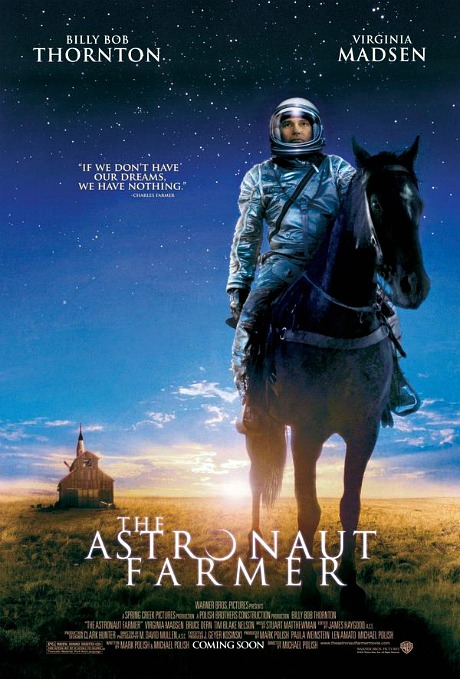
Someone declared on Twitter the other day that this is a legendary poster. It’s fairly startling. Can’t think of any reason to differ. Except I can’t even remember the story of this film, and I’m fairly sure I saw it.
Remove Cat Hair From Black Suit
I’m sorry but I’ve been up since 5 am with the Oscar noms and I feel…you know, kinda whipped. Deflated is a better term. Plus I need to start preparing for hitting the BFCA’s 20th Annual Critics Choice Movie Awards at the Hollywood Palladium. Fast nap, run three or four errands, wash the car, spiff myself up. I’m supposed to be there by 5 pm with the show starting at 6 pm Pacific. A & E is broadcasting live. The BFCA voters tend to reflect much of what the Academy likes, true, but at the same time they’re a tiny bit looser and a lot less geriatic.

Lads Given To Song
“A welcome return by The Red Violin director Francois Girard, this relatively by-the-numbers boarding-school drama distinguishes itself through song, thanks to the exceptional musical talents of the American Boychoir School, preteen sopranos whose otherworldly talent lasts for only a few years at most. The mystery of where that ability comes from, coupled with the urgency to share it, lends urgency to an otherwise generic coming-of-ager sure to delight those seeking spiritually grounded, emotionally uplifting entertainment. Boychoir may be soft, but it’s not run-of-the-mill TV-movie treacle, offering just enough edge to lend credibility while keeping it appropriate for all ages.” — from Peter Debruge‘s Toronto Film Festival Variety review. Dave Franco‘s cinematography is clearly first rate.
Oscars Have Become Old-White-Guy Stanley Kramer Awards
Sasha Stone is hopping mad about the Academy’s older-white-guy bias and particularly the preferential voting system, instituted in 2011, which has seemed to encourage the selecting of compassionate, positive-minded, safe-wheelhouse default films for Best Picture — films that are largely about making white guys look good, she claims. The Golden Globe Awards and Critics Choice Awards (which are happening this evening by the way) are arguably more reflective of the culture at large, she argues, while the Oscar nominations mostly reflect the tastes of an elite fraternity of old, priveleged fellows. Guys who think a certain way and who want to applaud a certain kind of uplifting film…a lament we’ve been hearing for years.
Maybe so, but I deduced a long time ago that the overwhelmingly gray-haired makeup of the Academy (an L.A. Times survey determined that only about 14% of Academy membership is under 50) means that a certain laziness and lack of stamina is coloring everything. And for this older women are just as much to blame as older men.
Last year I became friendly with a smart, sophisticated, once-happening actress who had recently served on a SAG committee of some kind. Her basic attitude about seeing films was to not see them for the first nine to ten months of the year, she once told me, and then start paying attention in late October or November. On her own she never sought out well-reviewed flicks playing at the Sundance Cinemas or the West L.A. Landmark or the Royal. She never seemed to go to the Aero to see an occasional special revival or preview of something new. She just wrote her stage plays (a pretty good playwright) and watched television and walked her dog and hung with her friends through the winter, spring, summer and early fall.
And then, when duty called in the mid to late fall, she would begin to attend screenings or watch screeners now and then. Movies were not her passion or a way of life or even a source of once-a-month diversion. She saw them over the last two or three months every year so she could remain an active voter and an honorable SAG member. But she mainly seemed to regard new films as an energy-draining chore.
Cotillard to Oscar Gurus: “Hah!”
This morning’s biggest Oscar Dawn surprise was the Best Actress nomination handed to Two Days, One Night‘s Marion Cottilard, which happened without any evident campaigning. Five weeks ago I posted a piece about what I was calling “the Cotillard surge,” as indicated by three then-recent critics group awards. Re-read it, Oscar handicappers, and weep:
“After winning the New York Film Critics Circle award for Best Actress a week ago, Two Days, One Night‘s Marion Cotillard won the same award yesterday from the Boston Film Critics Society and the New York Film Critics Online. Today she was nominated for the same award by the Online Film Critics Society. A few hours ago I wrote some colleagues and asked why they were ignoring what I called “the Cotillard surge.” I also asked why none of the critics groups have even mentioned presumed Best Actress frontrunner Julianne Moore except the LAFCA lunch-breakers, who named her the Best Actress runner-up behind Boyhood‘s Patricia Arquette.
“You can’t be total ostriches,” I said. “I’m as much of an industry whore with my hand out as anybody else, but at least I’m acknowledging that Cotillard has definitely elbowed her way into the Best Actress race…you can’t just keep saying ‘Julianne Moore is due’ over and over.”
“I’m gonna write about this,” said Awards Daily‘s Sasha Stone,”but Julianne so has this.” (A couple of hours later she posted this.) “Moore has this, I get that, yes,” I replied, “but it seems right now as if you and yours are hiding your heads in the sand about the Cotillard surge. She doesn’t fit into the narrative and I get that, but she’s happening right now. You can’t push this idea away over and over. You have to let it in.”
An award columnist asked, “Is there an Oscar consultant hired for her campaign? Will the DVD be sent to AMPAS members? If no & no, she’s a bye-bye.”

